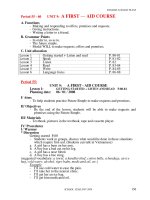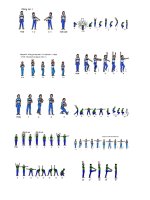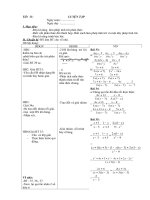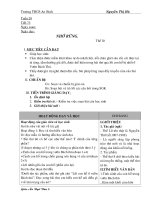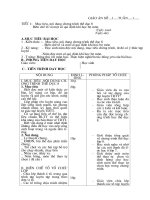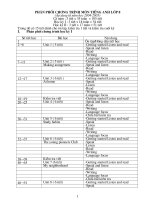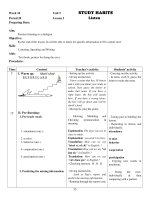Giao An 8 HK1- U 5-8
Bạn đang xem bản rút gọn của tài liệu. Xem và tải ngay bản đầy đủ của tài liệu tại đây (341.8 KB, 45 trang )
Week 10 Unit 5 STUDY HABITS
Period 28 Lesson 3 Listen
Preparing Date:
Aim:
Practice listening to a dialogue.
Objective:
By the end of the lesson, Ss will be able to listen for specific information to fill a report card.
Skill:
Listening, Speaking and Writing.
Aids:
Text book, posters for doing the exer.
Procedure:
Time Content Teacher’s activity Students’ activity
5’
12’
I. Warm up: Shark’s food
R E P O R T C A R D
II. Pre-listening:
1. Pre-teach vocab.
1. attendance (unc.):
2. to miss:
3. behavior (unc.)
4. cooperation (unc.)
5. participation (unc.)
2. Predicting the missing information:
- Setting up the activity.
- Giving instructions.
I have a noun that has 10 letters
and it tells you about your study at
school. Now guess the letters to
make that noun. If you have a right
letter, the boy still stands here. If
you have a wrong letter, the boy
will go down and will be shark’s
food.
- Having Ss. play the game.
- Eliciting, Modeling and
Checking pronunciation &
meaning
Explanation: The days you are in
class to study.
Explanation: you aren’t in class.
Translation: How can we say
“hành vi, cử chỉ” in English ?
Translation: How can we say “sự
hợp tác” in English ?
Translation: How can we say
“việc tham gia” in English ?
- Checking memory. R . O . R
- Giving instructions.
Look at Nga’s report and predict
the missing information.
- Running through the report card.
- Carrying out the activity.
- In turns, each S. guess the
letter to make the noun.
- Taking part in building the
lesson.
- Repeating in chorus and
individually.
attendance
to miss
behavior
cooperation
participation
- Copying new words in
notebooks
- Doing the exer.
individually & then
comparing with a partner.
55
15’
10’
3’
III. While-listening:
1. Correction of the prediction:
Keys:
1. 87 2. 5 3. S 4. C 5. A 6. A 7. B
8. Miss Blake.
2. True (T) or False (F) statements
a. Miss Blake met Mrs. Chen in the
evening.
b. Sarah’ s grades are good.
c. Miss Blake has some books which
Sarah can borrow.
d. Sarah should listen to the Spanish
radio programs to improve her
listening.
IV. Post-listening: Mapped – dialogue
Mrs. Chen Sarah
• Sarah ?
Are you …… ?
• I got ………
………. Today.
• Don’t
worry. You ……
very…. But
you …….. to
………… your
English …….
• Yes, I’m
…… What’s………
?
• Oh ! Is ……
a …
… … ?
• Yes, I’ll
…..my …….
V. Homework:
Writing about Sarah’s study at school.
Model:
Sarah studied very well this semester. Her
speaking and reading are excellent and
her writing is ………
- Letting Ss to listen to the tape
twice.
- Letting Ss to listen to the tape
the third time
- Giving instructions.
Listen to the tape and write T or F
- Letting Ss to listen to the tape
twice.
- Correcting & conducting
feedback.
- Asking Ss some questions to map
the dialogue between Mrs. Chen
and Sarah.
• How do you say to know
that S.O is at home ?
• How do you answer if you
are home ?
• How do you say to tell S.O
that you got a report card ?
• How do you say to know
that the report card is good ?
• How do you say if the
report card is good. But
having one thing to improve ?
• How do you say to promise
that you will try hard.
- Modeling.
- Monitoring & assisting.
- Asking Ss to practice in close
pairs and open pairs.
- Setting the task for Ss.
- Giving instructions.
Write a passage about Sarah’s
study at school by using the
information from the report card.
- Modeling.
- Listening to the tape and
checking the prediction.
- Listening & comparing the
answers with a partner.
- Listening to the tape and
writing T or F individually,
then comparing with a
partner.
- Correcting if necessary.
- Answering the questions to
map the dialogue.
• Are you home ?
• Yes, I’m here.
• I got your report
card.
• Is it a good report ?
• Don’t worry. You
worked very well but
you need to improve …
• I’ll do my best.
- Repeating in chorus &
individually.
- Practicing speaking in close
pairs & open pairs.
- Listening & taking note in
notebooks.
56
Week 10 Unit 5 STUDY HABITS
Period 29 Lesson 4 Read
Preparing Date:
Aim:
Practice reading a text for details.
Objective:
By the end of the lesson, Ss will be able to know how language learner learn vocabulary.
Skills:
Reading, Speaking, Listening and Writing.
Aids:
Text book, posters for doing the exer.
Procedure:
Time Content Teacher’s activity Students’ activity
5’
12’
I. Warm up: Brainstorming
learning by heart translating
Ways of learning
English words
II. Pre-reading:
1. Pre-teach vocab.
1. mother tongue (unc):
2. to underline:
3. to highlight:
4. to stick:
5. revision (unc):
6. to come across:
2. True (T) or false (F) prediction:
a. All language learners write the
meaning of new words in their
mother tongue.
b. Some learners write examples of
words they want to learn.
c. Every learner tries to learn all
new words they come across.
- Setting up the activity.
- Giving instructions.
Think of the way of learning
English vocabulary.
- Writing Ss’ ideas on the board.
- Eliciting, Modeling, Checking
pronunciation & meaning.
Example: Vietnamese is our
mother tongue.
Mime: I underline the words.
Mime: I highlight the words.
Mime: I stick a paper on the
board.
Explanation: I often have the
revision of my old lessons before
preparing new lessons.
Translation: How do we say “baét
gaëp” in English ?
- Checking memory: R . O . R
- Giving instructions
You are going to read a passage
about the ways of learning
vocabulary. Work in pairs to
predict which sentences are True
and which are False.
- Modeling.
- Writing Ss’ prediction on the
board.
- The whole class carry the
activity.
- Taking part in building the
lesson.
- Repeating in chorus &
individually.
mother tongue
underline
highlight
stick
revision
come across
- Copying new words in
notebooks.
- Doing the exer.
individually & then
comparing with a partner.
57
15’
12’
1’
d. Many learners only learn new
words that are important.
III. While-reading:
1. Correction of Ss’ prediction:
Keys
a. F b. T c. F d. T
2. Answering the questions:
(Exer. 2 Page 50)
Keys:
a. No, they didn’t.
b. Because they want to remember
how to use the word in the right
way.
c. In order to remember words
better, some learners even write
each word and its use on a small
piece of paper and stick it
somewhere in their house.
d. Because they only want to learn
important words.
e. Revision is necessary in learning
words.
f. I should find out the best way of
learning words.
IV. Post-reading: Gap-filling
Language learners learn words in
many ways. Some ……(1)…… write the
meaning of the words in their ……(2)…….
Some others write example sentences with
new ……(3)…… Some learners …(4)……… or
……(5)….. the important words that they
want to learn. But ……(6)…….. is necessary
in learning words.
V. Homework:
Writing the ways of learning English
words.
- Giving instructions.
Read the passage silently and
check the prediction & then
compare the answers with a
partner.
- Giving feedback.
- Giving instructions.
Read the passage again and
answer the questions in the exer. 2
on page 50.
- Modeling.
- Monitoring & assisting.
- Correcting & conducting
feedback.
- Asking Ss. to practice asking and
answering the questions in pairs.
- Giving instructions.
Complete the summary by using
the suitable words from the
passage.
- Modeling.
- Monitoring & assisting.
- Giving feedback
Keys: 1. learners 2. mother
tongue 3. words 4. underline 5.
highlight 6. revision.
- Setting the tasks for Ss.
- Giving instructions.
Write the way of learning
English.
- Reading the passage
silently to check the
prediction individually.
- Comparing with a partner.
- Doing the exer.
individually, then comparing
the answers with a partner.
- Correcting if necessary.
- Practicing asking &
answering.
- Doing the exer.
individually & then
comparing with a partner.
- Correcting if necessary.
- Taking notes in notebooks.
58
Week 10 Unit 5 STUDY HABITS
Period 30 Lesson 5 Write
Preparing Date:
Aim:
Practice writing a letter to friends.
Objective:
By the end of the lesson, Ss will be able to know the form of a friendly letter and practice writing a letter to
friends.
Skills:
Writing, Speaking, and Reading.
Aids:
Text book, posters for doing the exer.
Procedure:
Time Content Teacher’s activity Students’ activity
5’
15’
I. Warm up: Chatting
Questions:
• Have you ever written to someone
?
• To whom do you usually write ?
• What do you write about ?
II. Pre-writing:
1. Pre-teach vocab.
1. the Mid Autumn Festival:
2. to celebrate:
3. a postcard:
2. Presenting the form of a letter:
• The correct parts of a letter.
a. Heading – writer’s address and the
date.
b. Opening – Dear ……,
c. Body of the letter
d. Closing – Your friend / Regard /
Love.
3. Comprehension questions:
- Asking Ss some questions
dealing with writing letters.
- Eliciting, Modeling, Checking
pronunciation & meaning.
Explanation: What do you call
the Tet for children in August ?
Translation: How can we say “toå
chöùc kæ nieäm” in English ?
Realia: What do you call it in
English ?
- Checking memory: R . O . R
- Asking Ss to label the parts of
the letter with Hoa’s letter.
- Modeling.
- Monitoring & assisting.
- Giving feedback.
- Reminding Ss how to write a
letter.
- Giving instructions.
Read the letter of Hoa silently
- The whole class taking part
in answering the questions.
- Taking part in building the
lesson.
- Repeating in chorus and
individually.
the Mid Autumn Festival
to celebrate
a postcard
- Copying new words in
notebooks.
- Doing the exer.
individually and then
comparing with a partner.
- Reading Hoa’s letter and
answering the questions.
59
15’
8’
2’
a. What is Hoa pleased to hear ?
b. What did Hoa receive a few days ago
?
c. What subject is Hoa good at ?
d. What subject did she need to
improve ?
e. What is she going to celebrate in
Hue ?
III. While-writing:
1. Answering the questions:
a. Did Donna have an enjoyable
Mother’s Day ?
b. What did you receive last month ?
c. Which subjects did you get good
grades ?
d. What did your teacher tell you to
improve ?
e. What are you going to celebrate in
a few weeks ? What is that called in
Vietnam ?
f. Where are you going with your
aunt and uncle ? by how ? when ?
g. What will you send to your
friend ?
2. Writing the letter:
IV. Post-writing:
Model:
24 Tran Phu street,
Vinh Long, Vietnam,
Nov. 20, 2006.
Dear Donna,
Thanks for your letter. I’m please to hear
you had an enjoyable Mother’s Day.
I received my second semester report lat
month. I got good grades for Geography
physics and Math, but My teacher told me
to improve my English & History. ………
V. Homework:
Writing the complete letter in
notebooks.
and answer the questions.
- Modeling.
- Monitoring & assisting.
- Correcting & conducting
feedback.
- Giving instructions.
Answer the questions by using
the given information about Lan’s
letter to Donna, her pen pal.
- Modeling.
- Monitoring & assisting.
- Giving feedback.
- Giving instructions.
Imagine you are Lan. Write a
letter to your penpal Donna in
Sans Francisco by using the given
information. Work in 4 groups.
- Modeling.
- Monitoring & assisting.
- Correcting & conducting
feedback.
- Asking one or two Ss to read out
the letter in front of class.
- Setting the task for Ss.
- Giving instructions.
Write the complete letter in your
notebooks.
- Working in pairs to answer
the questions.
- Correcting the mistakes if
necessary.
- Working in 4 groups to
write a letter to Donna in
posters.
- Hanging the posters on the
board.
- Correcting the mistakes
with the teacher.
- One or two Ss read out the
letter.
- Taking notes in notebooks.
60
Week 11 Unit 5 STUDY HABITS
Period 31 Lesson 6 Language focus 3 – 4
Preparing Date:
Aim:
Practicing commands, requests and advice in reported speech.
Objective:
By the end of the lesson, Ss will be able to use reported speech with commands, requests and advice.
Skill:
Speaking, Writing and listening.
Aids:
Text book, posters for doing the exer.
Procedure:
Time Content Teacher’s activity Students’ activity
5’
13’
I. Warm up: Word square
P R O N O U N C E R
R E O U V L N E
A A Q L B I P
C D F K T S Y O
T S E M E S T E R
I R P W R I T E K T
C E P L U N C
E F A S K D G A
M K B H Y L R
A E W D V D
II. Presentation:
1. Set the scene:
--
- Setting up the activity.
- Giving instructions
Work in pairs to find out 10
words about study in the word
square, then compare in two
groups.
- Modeling.
- Giving instructions.
Work in 2 groups, Ss from each
group write the correct words on
the board. The group has more
and correct words is the winner.
- Monitoring & assisting Ss.
- Feeding back.
- Congratulating.
- Setting the scene by situation.
The teacher asks Ss “Please open
your books” and “you should keep
silent.” Because Nam is talking,
he can’t hear what the teacher
asked. So he asks Lan what the
teacher said. How can Lan answer
?
- Presenting the new target
language.
- Checking concept.
Meaning: Tell me the Vietnamese
meaning of 2 sentences.
Form: How can we form these
patterns ?
- Carrying out the activity in
close pairs, then in 2 groups.
- Each group writes the
words on the board.
• Possible
answers.
Pronounce,
semester, write, ask.
Practice, read, speak,
study, listen, report card
- Choosing and
congratulating the winner.
- Listening to the teacher
and taking part in building
the lesson.
- Answering the questions to
show how to understand the
new patterns.
61
“Please open your books” and
“You should keep silent”
What did
teacher said ?
The teacher asked
us to open our
books.
15’
10’
2’
2. Target language:
• The teacher asked us to open
our books.
• He said we should keep silent.
Form:
S + asked / told + O + to - inf. …
S + said + S + should + inf. …
Use: reporting a comment or an advice.
III. Practice: Word cue drill.
• Comments & Request:
a. Please wait for me outside my
office.
b. Please give Tim his report card for
this semester.
c. Can you meet me next week ?
• Advice:
a. Tim should spend more time on
Spanish pronunciation.
b. Tim should practice speaking
Spanish everyday.
c. Tim should listen to Spanish on
TV.
IV. Production: Writing
Model:
1. She asked me to
read an English story.
2. He asked me to
buy a new book.
3. They told us to
do the homework.
4. The teacher
asked you to give her your report cards.
5. She said you
should improve your speaking and
listening.
6. He said I should
try my best.
V. Homework:
Copying the exer. 3 & 4 in notebooks.
Use: what do we use the patterns
for ?
Pronunciation: Do we say
[a:skid ] or [ a:skt ] ?
- Giving instructions.
Imagine you are Tim and Tim’s
mother. Report the comments,
requests and advice of Miss
Jackson.
- Modeling.
S
1
:What did the teacher ask you ?
S
2
: She asked me to wait for her
outside her office.
S
1
: What did the teacher say ?
S
2
: She said you should spend
more time on Spanish
pronunciation.
- Monitoring & assisting.
- Correcting & conducting
feedback.
- Giving instructions.
Work in 4 groups to write as
many as reported speeches
possible. In 5 minutes, which
group has more and correct
sentences is the winner.
- Modeling.
- Monitoring & assisting.
- Feeding back.
- Evaluating.
- Setting the task for Ss.
- Giving instructions.
Copy the reported speeches of
the exer. 3 &4 in your notebooks.
- Copying the patterns in
notebooks.
- Listening & taking part in
model with the teacher.
- Practicing in 2 groups.
- Practicing in close pairs,
then open pairs.
- Working in 4 groups to
write as many reported
speeches possible in posters.
- Hanging the posters on the
board after 5 minutes.
- Correcting the mistakes
with the teacher.
- Congratulating the winner.
- Taking notes in notebooks.
62
Unit 6: THE YOUNG PIONEERS CLUB
Aim:
Helping students:
- Talk about the future.
- Ask for favors and offer assistance.
- Write a letter telling about the future plan.
Language focus:
1. Simple present tense with future meaning.
2. Gerund
3. Modal verbs: may, can, could.
Unit Allocation:
Lesson 1 Listen and Read
Language Focus 1
Listening & reading the dialogue for details and
practice the present tense with future meaning.
Lesson 2 Speak Practice asking for favors and offering the assistance.
Lesson 3 Listen Listening to the story for details.
Lesson 4 Read Reading the passage about the Boy Scout of America.
Lesson 5 Write Writing a letter about a future plan.
Lesson 6 Language focus 2 -3 Further Practice using the prepositions of time, the
simple past & structure with: Used to
Kiểm tra của tổ chuyên môn Duyệt của Ban Giám Hiệu
63
Week 11 Unit 6 THE YOUNG PIONEERS CLUB
Period 32 Lesson 1 Listen & Read – Lang. focus 2
Preparing Date:
Aim:
Reading for details and practicing the gerunds
Objective:
By the end of the lesson, Ss will be able to know about Nga’s details and use the gerunds.
Skill:
Reading, Writing, Speaking and Listening.
Aids:
Text book, posters for doing the exer.
Procedure:
Time Content Teacher’s activity Students’ activity
5’
15’
I. Warm up: Chatting
• Questions:
1. What do you usually do in
the summer ?
2. Do you often take part in
any activity programs for the summer ?
3. What activity do you like
most ?
II. Presentation:
1. Pre-teach vocab.
1. to enroll:
2. an application form:
3. to fill out:
2. Set the scene:
3. Guiding questions:
a. When was Nga born ?
b. Where does she live ?
c. What does she like ?
- Asking Ss some questions about
their activities in the summer.
- Eliciting, Modeling, Checking
pronunciation & meaning.
Translation: How do we say
“ñaêng kí” in English ?
Visual: What do call this in
English ?
Mime: I fill out the blanks.
- Checking memory: R . O . R
- Setting the scene.
Nga is enrolling for the summer
activities. Work in pairs to answer
the questions.
- Writing Ss’ prediction on the
board.
- The whole class take part
in answering the questions.
- Taking part in building the
lesson.
- Repeating in chorus and
individually.
to enroll
an application form
to fill out
- Copying new words in
notebooks.
- Listening to the teacher &
predicting the answers in
pairs, then in groups. (books
shut)
- Giving teacher the
prediction.
64
8’
15’
2’
d. What does she enjoy ?
4. Listen & answer:
Keys:
a. April 22, 1989 b. 5 Tran Phu St.
c. drawing d. acting.
5. Listen and repeat:
6. Practice with a partner:
7. Target Language:
She likes drawing and she enjoys acting.
S + +V
-
ing
… …
Notes: stop --- > stopping
change --- > changing
write --- > writing
III. Practice: word - cue drill
Model:
S
1
: What do you like doing ?
S
2
: I like cooking meals.
a. I / cook meals.
b. They / watch TV.
c. He / play soccer.
d. Lan / do homework.
IV. Production:
1. Doing the exer. 2. a. Page 61
Model:
S
1
: Ba loves playing soccer, but he doesn’t
like washing up.
S
2
: Lan doesn’t like playing soccer, and she
doesn’t like washing up, either.
2. Doing the exer. 2. b. Page 61
Model:
S
1
: Do you like playing soccer ?
S
2
: No. I hate it. What about you ?
S
1
: Yes. I love playing soccer.
V. Homework:
- Letting Ss listen to the tape
twice.
- Letting Ss listen to the tape the
third.
- Giving feedback.
- Letting Ss repeat the answer c.
& d.
- Letting Ss ask & answer the
questions c. & d.
- Presenting new target language.
- Checking concept.
Meaning: Tell me the Vietnamese
meaning of the sent.
Form: How do we form this
pattern ? What is after likes … ?
Use: When do we use V
-
ing
?
Pronunciation: Do we say acting
or act/ ing ?
- Giving instructions.
Ask and answer by using the
cues.
- Modeling.
- Monitoring & assisting.
- Giving feedback.
- Giving instructions.
Look at the table and talk about
Ba and Lan’s hobbies.
- Modeling.
- Monitoring & assisting Ss.
- Correcting & conducting
feedback.
- Giving instructions.
Work in pairs to ask and answer
questions about your own hobbies.
- Modeling
- Monitoring & assisting Ss.
- Feeding back.
- Setting the task for Ss.
- Giving instructions.
- Listening to the tape and
checking the prediction.
- Comparing the answers
with a partner.
- Correcting the wrong ans.
- Repeating the answers in
chorus & individually.
- Practicing in 2 groups, then
in pairs
- Listening & answering the
questions to show how to
know the new pattern.
- Copying new pattern in
notebooks.
- Listening & taking part in
the model with teacher.
- Practicing in 2 groups.
- Practicing in close pairs,
then open pairs.
- Working in pairs to talk
about Ba & Lan’ hobbies.
- Practicing in close pairs,
then open pairs.
- Practicing in close pairs,
then open pairs.
- Taking notes in notebooks.
65
like, love, enjoy
hate, dislike
Doing the exer. 2 Page 55
Read the dialogue and complete
Nga’s details.
Week 11 Unit 6 THE YOUNG PIONEERS CLUB
Period 33 Lesson 2 Speak
Preparing Date:
Aim:
Practicing asking favors and assistance
Objective:
By the end of the lesson, Ss will be able to know how to ask & respond to favors and assistance.
Skill:
Speaking and Listening.
Aids:
Text book, posters for doing the exer.
Procedure:
Time Content Teacher’s activity Students’ activity
5’
15’
I. Warm up: Chatting
1. Do you often help another people ?
2. What do you often do to help them ?
3. Do you often need any help ?
4. What do you say to get one’s help ?
II. Pre-speaking: Dialogue build
• Dialogue 1:
Mrs. Ngoc: Could you do me a favor ?
Hoa: Sure. What can I do for you ?
Mrs. Ngoc: Can you help me carry my
bags ? I’ve hurt my arm.
Hoa: Certainly. I’ll help you.
Mrs. Ngoc: Thank you very much. That’s
very kind of you.
Asking for
favors
Responding to
favors
- Can / could you
help me please ?
- Could you do me
a favor ?
- I need a favor.
- Can / could you ..
- Certainly / of
course / sure.
- No problem.
- What can I do for
you ?
- How can I help
you ?
- Asking Ss some questions..
- Setting the scene.
Mrs. Ngoc is carrying heavy
bags, but she’s hurt her arm so
she needs some help.
- Modeling the dialogue.
- Asking Ss to work in 2 groups,
then in close pairs to practice the
dialogue.
- Monitoring & assisting.
- Asking Ss to complete the dia.
- Presenting how to ask & respond
to favors by asking Ss questions.
• What does Mrs. Ngoc
say to need some help ?
• How can Hoa respond
?
• Give another ways to
ask & respond to favors.
- Listening & taking part in
building the dialogue with
teacher.
- Repeating in chorus.
- Repeating in 2 groups, then
close pairs.
- Completing the dialogue.
- Answering the questions to
show how know the new
lesson.
• Could you do me a
favor ?
• Sure. What can I do
for you ?
• I need a favor-No
problem.
66
8’
15’
- I’m sorry. I’m
really busy.
• Dialogue 2:
Receptionist: May I help you ?
Tourist: Yes. Can you show me the way to
the nearest bank ?
Receptionist: Sure. Turn left and then turn
right at the first corner. It’s on your right.
Tourist: Thank you very much.
Offering
assistance
Responding to
assistance
- May I help you ?
- Do you need any
help ?
- Let me help you.
- Yes. That’s very
kind of you.
- No. Thank you.
- No. Thank you.
I’m fine. I can
manage.
III. While-speaking:
• Repeating the phrases in the
boxes in page 55.
• Practice acting out the 2
dialogues above.
IV. Post-speaking:
1. Practicing asking and responding
to favors:
Tourist: I need a favor.
You: What can I do for you ?
Tourist: Yes. Can you show me the way to
the nearest bank ?
You: Sure. Go straight ahead. Then turn
left. It’s on your right.
Tourist: Thanks very much.
2. Practicing offering & responding
to assistance.
You: May I help you ?
Neighbor: Yes. Can you help me tidy the
yard ? I’ve had a broken leg.
You: Certainly. I’ll help you.
Neighbor: Thanks very much. That’s very
kind of you.
IV. Homework:
- Setting the scene.
A receptionist wants to help a
tourist who needs to go to the
nearest bank.
- Modeling the dialogue.
- Asking Ss to practice the
dialogue in 2 groups & then in
close pairs.
- Monitoring & assisting.
- Asking Ss to complete the dia.
- Presenting how to offer &
respond to assistance by asking
the questions.
• What does the receptionist
say to help the tourist ?
• How can the tourist
respond ?
• Give another way to offer
& respond to assistance.
- Running through the phrases in
the boxes.
- Asking Ss to practice the
dialogues in pairs.
- Giving instructions.
A tourist wants to go to a police
station because he lost money.
Work in close pairs to make a
dialogue.
- Modeling.
- Monitoring & assistance.
- Giving feedback.
- Giving instructions.
Your neighbor has had a broken
leg. You want to help her. Work in
close pairs to make a dialogue.
- Modeling.
- Monitoring & assisting.
- Giving feedback.
- Listening & taking part in
building the dialogue with
teacher.
- Practicing in 2 groups &
then in close pairs.
- Completing the dialogue.
- Answering the questions to
show how know the new
lesson.
• May I help you ?
• Yes. Can you ………?
• Let me help you –
No. Thank you.
- Repeating the phrases in
the boxes.
- Practicing the dialogues in
close pairs, then open pairs.
- Listening & making the
dialogue with a partner.
- Practicing in close pairs.
- Practicing in open pairs.
- Listening & making the
dialogue with a partner.
- Practicing in close pairs.
- Practicing in open pairs.
67
2’ Writing the dialogue between you and
your aunt who is busy cooking meal. - Setting the task for Ss.
- Giving instructions.
Make the dialogue between you
and your aunt who is busy cooking
meal.
- Taking notes in notebooks.
Week 12 Unit 6 THE YOUNG PIONEERS CLUB
Period 34 Lesson 3 Listen
Preparing Date:
Aim:
Practicing listening for details.
Objective:
By the end of the lesson, Ss will be able to complete the song and practice singing the song.
Skill:
Listening, Speaking and Reading
Aids:
Text book, tape.
Procedure:
Time Content Teacher’s activity Students’ activity
5’
10’
15’
I. Warm up: Singing an English song.
II. Pre-listening:
1. Pre-teach vocab.
1. to unite:
2. peace (un.)
2. Guessing the missing words:
(Exercise
III. While-listening:
Tape script in teacher’s book.
Keys:
1. unite 2. peace 3.right 4. North
5. South 6. of 7. world 8. place
9. out 10. world
- Having Ss sing an English song.
- Eliciting, Modeling, Checking
pronunciation & meaning.
Explanation: What makes the
strength ?
Translation: How do we say “hoaø
bình” in English ?
- Giving instructions:
Work in pairs to guess the words
to fill in the gaps in the song in
page 56.
- Writing the Ss’ words on the
board.
- Letting Ss listen to the song
twice and then correct the
guessing above.
- Letting Ss listen to the song the
third.
- Correcting & conducting
feedback.
- Singing an English song.
- Taking part in building the
lesson.
- Repeating in chorus and
individually.
to unite
peace
- Working in pairs to guess
the words.
- Listening to the song &
correcting the guessing.
- Comparing with a partner.
- Correcting.
68
13’
2’
IV. Post-listening:
• Practicing singing the song.
V. Homework:
• Singing the song at home.
- Letting Ss practice singing the
song.
- Asking Ss to practice singing the
song.
- Practicing singing the song
in chorus & individually.
- Taking notes.
Week 12 Unit 6 THE YOUNG PIONEERS CLUB
Period 35 Lesson 4 Read
Preparing Date:
Aim:
Practicing reading the passage about the boys Scout of America.
Objective:
By the end of the lesson, Ss will be able to know more about a youth organization – the Boy Scouts of America
(BSA).
Skill:
Reading, Listening and Speaking.
Aids:
Text book, posters.
Procedure:
Time Content Teacher’s activity Students’ activity
5’
13’
I. Warm up: jumbled words
• racchtaer ----- > character
• oinj ----- > join
• nessbusiman ----- > businessman
• plainex ----- > explain
• ganizaortion ----- > organization
II. Pre-reading:
1. Pre-teach vocab.
1. to encourage:
2. citizenship (unc.)
4. coeducational (adj.)
5. to lead - led - led:
6. to establish:
- Setting up the activity.
- Giving instructions.
Arrange these letters to make a
meaningful words. Work in 2
groups. In turns, each group write
the correct words on the board.
The group has more and correct
words is the winner.
- Modeling.
- Feeding back.
- Eliciting, Modeling, Checking
pronunciation & meaning.
Explanation: to give someone
support.
Translation: How do we say
“quyeàn coâng daân” in English ?
Explanation: being educational
for boys and girls together.
Translation: How do we say “ñöa
ñeán, daãn ñeán” in English ?
Synonym: give the synonym of to
- Working in 2 groups to
carry out the activity.
- Correcting & choosing the
winner.
- Taking part in building the
lesson.
- Repeating in chorus &
individually.
to encourage
citizenship
coeducational
to lead
to establish
69
15’
10’
2. True (T) or False (F) predictions:
a. The Boy Scout of America is a
youth organization.
b. Scouting began in America.
c. William Boyce is a businessman in
London.
d. Boys and girls can join BSA.
e. The Scouting Association is the
biggest voluntary youth
organization in the world.
II. While-reading:
1. Correction of Ss’ prediction:
Keys:
a. T b. F c. F d. F e. T
2. Answering the questions:
(Exer. 2 on page 57)
Keys:
a. Scouting began in England in 1907.
b. The meeting between a boy scout
and Mr. William Boyce led to the
Scouts Association crossing the
Atlantic in 1910.
c. Girls can join in the Girls Guides
Association and Cam Fire Boys
and Girls.
d. They are building characters, good
citizenship and personal fitness.
IV. Post-reading: (Exer. 1 Page 57)
Keys:
start or to create an organization.
- Checking memory: R. O . R
- Giving instructions.
You are going to read a passage
about the Boy Scout of America.
Predict which statements are True
and which are False.
- Modeling.
- Monitoring & assisting.
- Writing Ss’ prediction on the
board.
- Giving instructions.
Read the passage silently to
check the prediction & then
compare the answers with a
partner.
- Giving feedback.
- Giving instructions.
Read the passage again and
answer the questions in the exer. 2
on page 57.
- Modeling.
- Monitoring & assisting.
- Correcting & conducting
feedback.
- Asking Ss to practice asking &
answering the questions.
- Giving instructions.
Read the passage again and fill
the missing dates for the events.
- Modeling.
- Monitoring & helping.
- Giving feedback.
- Copying new words in
notebooks.
- Doing the exer.
individually & then
comparing with a partner.
- Reading the passage
silently to check the
prediction individually.
- Comparing the answers
with a partner.
- Doing the exer.
individually & then
comparing with a partner.
- Correcting the wrong
answers if necessary.
- Practicing asking &
answering.
- Reading the passage and
doing the exer.
- Comparing with a partner.
- Correcting if necessary.
70
2’
Dates Events
a. 1907
b. 1909
c. 1910
d. 1994
• The beginning
of the Scout
Association.
• William Boyce
was introduced to
scouting.
• The founding of
the Girls Guides
Association & Cam
Fire Boys & Girls.
• Over 5 million
scouts in the BSA.
V. Homework:
Writing the summary of the BSA.
- Setting the task for Ss. - Taking notes in notebooks
Week 12 Unit 6 THE YOUNG PIONEERS CLUB
Period 36 Lesson 5 Getting started - Write
Preparing Date:
Aim:
Practicing writing a letter.
Objective:
By the end of the lesson, Ss will be able to write a letter about a future plan, using “be going to”.
Skill:
Writing, Reading, and Speaking.
Aids:
Text book, posters.
Procedure:
Time Content Teacher’s activity Students’ activity
5’
15’
I. Warm up: Chatting
• Questions:
1. What are you going to do ?
2. Are you going to help poor
people ?
3. What are you going to do to keep
your school clean ?
4. Are you going to help the elderly
people ?
II. Pre-writing:
1. Pre-teach vocab.
1. to participate = to join
- Giving instructions.
Imagine, you are going to join the
Young Pioneer and Youth
Organization. Answer the
questions.
- Asking Ss some questions.
- Eliciting, Modeling, Checking
pronunciation & meaning.
Synonym: Give me the synonym
of to join.
Translation: How do we say “gaây
quyõ” in English ?
- The whole class take part
in answering the questions.
- Taking part in building the
lesson.
- Repeating in chorus &
individually.
to participate
to raise fund
71
15’
2. to raise fund:
3. natural resources:
4. environment (unc.)
5. to earn some money:
2. Reading comprehension:
• Questions:
a. How is the Y & Y planning to help
the community ?
b. What do members of the Y & Y
have to do in recycling program ?
c. What is the purpose of the
recycling program ?
d. What other programs can members
of the Y & Y participate in ?
3. Completing Nga’s letter:
Keys:
1. community 2. recycling 3. collect
4. send 5. recycling 6. save 7. earn
8. participating 9. planting 10. helping
III. While-writing:
1. Answering the questions:
a. Why does Nga look happy ?
b. What is she going to do in the
environment month ?
c. What are they going to do to earn
money for their school Y& Y ?
d. What does she hope ?
2. Writing a letter:
Example: coal, oil, iron, gold …
under the ground or the sea are
called natural resources.
Translation: How do we say “moâi
tröôøng” in English ?
Explanation: to find out some
money.
- Checking memory: R . O . R
- Giving instructions.
Read the notice silently to find
the answers for the questions.
Answer the questions individually
& then compare with a partner.
- Modeling .
- Motoring & assisting.
- Giving feedback.
• Answers:
a. …by encouraging all members to
participate in recycling ……
b. … collect glass, used paper …
c. … to save natural resources …
d. …raising funds for the poor …
- Giving instructions.
Use the information in the notice
to complete Nga’s letter. Work
individually first, then compare
with a partner.
- Modeling.
- Monitoring & assisting.
- Feeding back.
- Giving instructions.
Read the dialogue between Hoa
and her aunt silently and answer
the questions.
- Modeling.
- Monitoring & assisting.
- Feeding back.
- Giving instructions.
Imagine you are Hoa to write to
your parents a similar letter to
Nga’s letter telling what you are
going to do.
- Modeling.
natural resources
environment
to earn some money
- Copying the new words in
notebooks.
- Answering the questions
individually & then
comparing with a partner.
- Giving the answers to the
teacher.
- Correcting the wrong
answers if necessary.
- Doing in the exer. first,
then comparing with a
partner.
- Correcting the wrong
words if necessary.
- Reading the dialogue
silently and answering the
questions individually.
- Comparing the answers
with a partner.
- Giving the answers to the
teacher.
- Writing a letter
individually.
72


